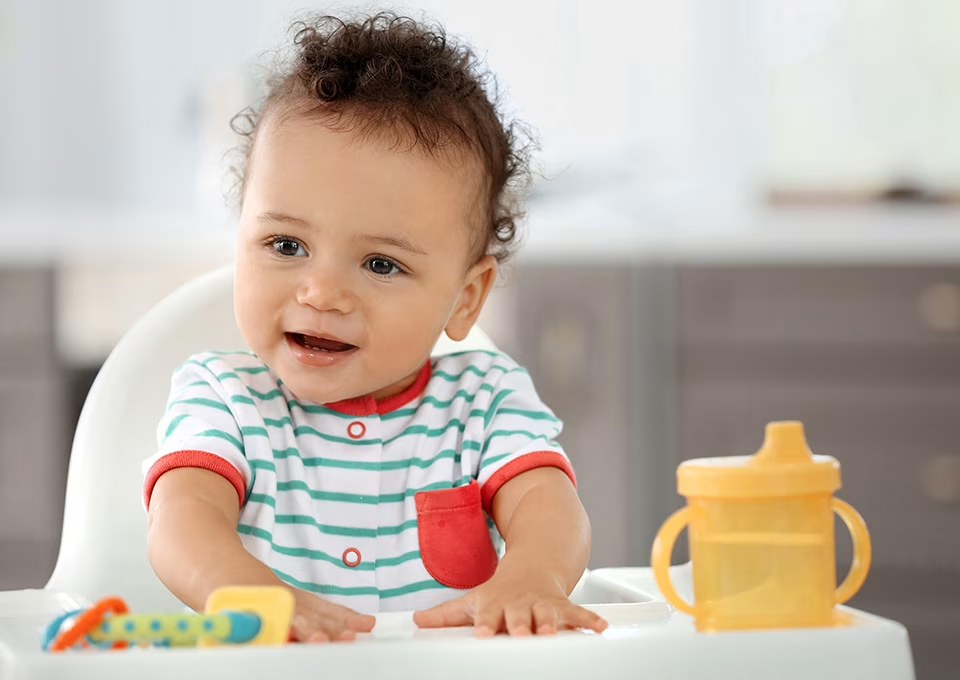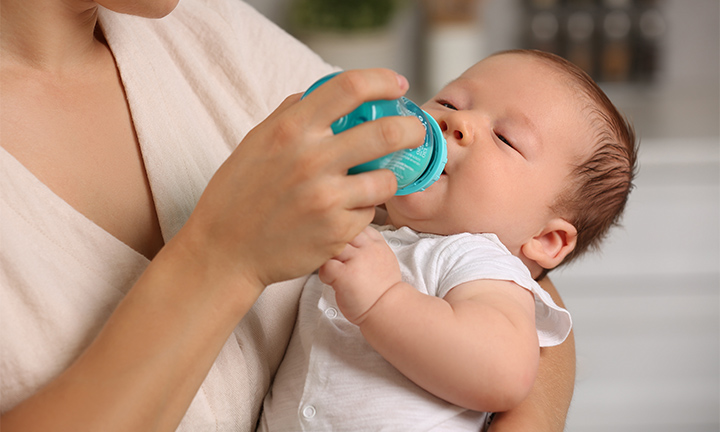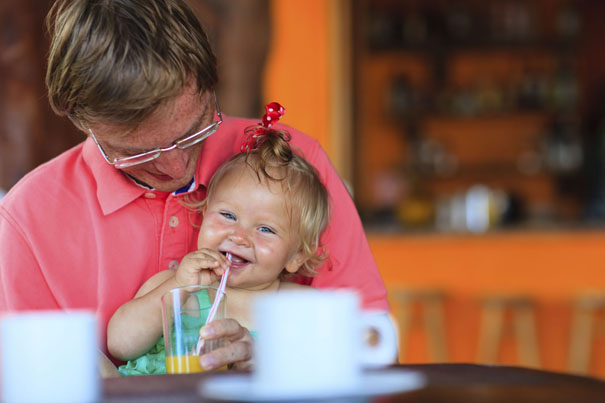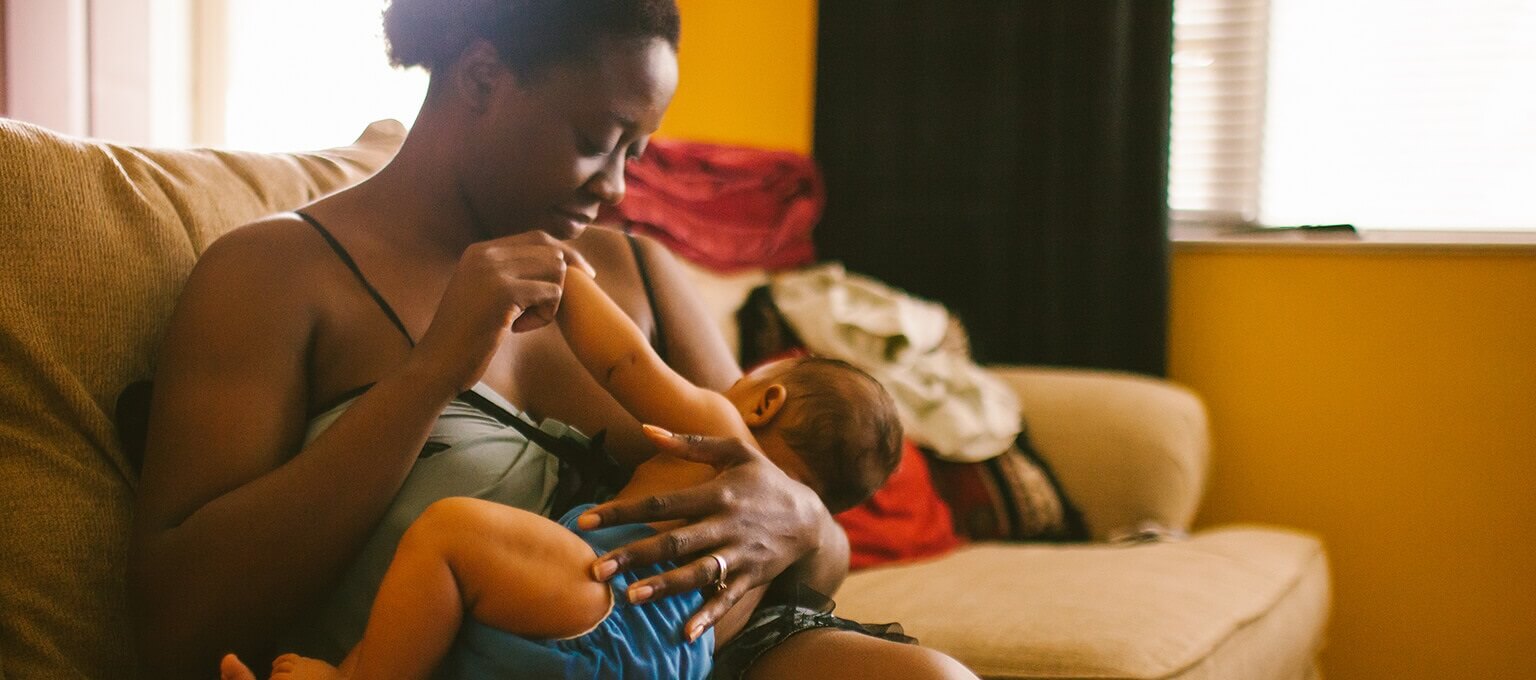
When Can Babies Drink Water?


Water is something that everyone needs to drink, right? But when can babies have water? Well, it turns out that babies get all the hydration they need from breast milk or formula in the first several months. Find out when babies can start drinking water, and why it’s important not to give your baby water until they’ve started on solids. Plus, get some answers to some frequently asked questions about safely giving your baby water when the time comes.
Can Babies Drink Water?
The simple answer is no. Babies under 6 months of age should not drink water. Even if it’s a hot day and/or you live in a hot climate. Drinking water can lead to diarrhea, malnutrition, or electrolyte imbalances in babies. Luckily, babies get all the liquid and hydration they need in breast milk or formula.
With breastfed babies, the introduction of water can cause the baby to breastfeed less or stop entirely, leading to malnutrition. Less frequent nursing can, in turn, result in a reduction in breast milk supply as well.
When Can Babies Start Drinking Water?
Water is not recommended for your baby in their first six months. Until your baby is eating solid food, they will get all the water they need from breast milk (which is actually 80% water) or formula. If your baby’s healthcare provider says it’s ok, you can start offering small amounts of water after your baby turns 6 months old.
Introducing Water to Babies
The best way to introduce water to your baby (who is 6 months or older) is to give them a small amount in a sippy cup. Don’t force them to drink the water if they reject it.
Your baby’s need for liquids will increase when they start eating solid foods.
So, when you start introducing solids to your baby, this is also a good time to slowly introduce water. Gradually giving your little one water also gives them a chance to get used to water’s plain flavor. Between 6 and 12 months of age, your little one only needs about 4 to 8 ounces of water per day. They will still be getting the rest of their liquids from breast milk or formula during this period.
Drinking water will also help your child develop healthy habits. Giving your baby juice (especially before 12 months of age) is not recommended, as it can cause them to crave sweetened drinks, and lead to weight problems and tooth decay.
So, what kind of water can babies drink? Some tap water might not be clean enough for your baby. Check with your local health department if you’re unsure about the quality of the tap water in your home.
If the water isn’t safe, you could use bottled water instead or boil the tap water for mixing with infant formula or for giving your baby once they’re over 6 months old.
To boil tap water, bring cold water to a boil for 1 minute. Then set it aside to cool to room temperature for about 30 minutes before using it. It’s a good idea to test the water on your wrist to ensure it’s at room temperature before giving it to your baby.
How Much Water Should Infants Drink?
After your baby turns 6 months, and their healthcare provider gives you the ok, you can start giving them small amounts of water. The recommended amount for 6 to 12-month-old babies is about 4 to 8 ounces (0.5 to 1 cup) of water per day.
Water and Formula
It’s OK to mix powdered formula with water. Just be careful to follow the manufacturer’s guidelines on how much water to add.
What's dangerous is adding extra water to the formula. Diluting formula or giving your baby water in addition to formula can lead to a condition called water intoxication.
Diluting infant formula beyond the manufacturer’s directions reduces the nutrients your baby is getting. This can lead to slowed growth and development, electrolyte imbalances, and possibly seizures.
Be sure to follow the manufacturer’s directions when mixing infant formula, and check out these formula-feeding guidelines.
Water Poisoning in Infants
Water poisoning or water intoxication, also called hyponatremia, is a condition in which the sodium level in the blood becomes abnormally low. Drinking too much water can cause this condition, which can lead to seizures.
A baby who is given water under the age of 6 months may be at risk for this condition.
Water intoxication requires emergency medical attention, and treatment may include intravenous electrolytes or medications. Contact your baby’s healthcare provider if you notice any of the symptoms listed in the section below, or if you have any concerns about water intoxication.
What Are the Symptoms of Water Intoxication in Infants?
Symptoms of water intoxication/hyponatremia in infants can include
Contact your baby’s healthcare provider if your little one experiences any of the above symptoms.
FAQS AT A GLANCE
Babies under six months should not be given water, as even small amounts can fill their stomachs, potentially interfering with their nutrient intake from breast milk or formula. Additionally, too much water can lead to water intoxication, which may disrupt their electrolyte balance. If your baby only had a small sip, they're likely fine, but monitor them for any signs of discomfort, such as irritability or sleepiness. Consult your healthcare provider if you have any concerns.
The Bottom Line
Even though giving your baby water may seem harmless, it’s not recommended until your little one is 6 months old. Your baby is getting all the nutrients and hydration they need from breast milk or formula.
With your baby drinking breast milk or formula, you’ll also be doing lots of diaper changes. To make the task a bit more rewarding, download the Pampers Rewards app to earn rewards on your Pampers purchases.
- American Academy of Pediatrics. Caring for Your Baby and Young Child: Birth to Age 5, 7th ed. (New York: Bantam Books, 2019).
- Mayo Clinic. Guide to Your Baby’s First Years, 2nd ed. (Rochester, MN: Mayo Clinic Press, 2020).
- Healthy Children: Choose Water for Healthy Hydration
- Healthy Children: How to safely prepare formula
- Healthy Children: Recommended Drinks for Children Age 5 & Younger
- Mayo Clinic: Babies Shouldn’t Drink Water — Here’s Why
- Mayo Clinic: Hyponatremia
- Mayo Clinic: Water: How much should you drink every day?
- WHO: Breastfeeding
Read more about Baby
Join a World of Support
through Pregnancy and Parenthood.
TRACK WITH TOOLS
LEARN WITH EXPERTS
GET REWARDED










